I Tried Captioning With As Many Creatures I Could Recognise
I tried captioning with as many creatures I could recognise
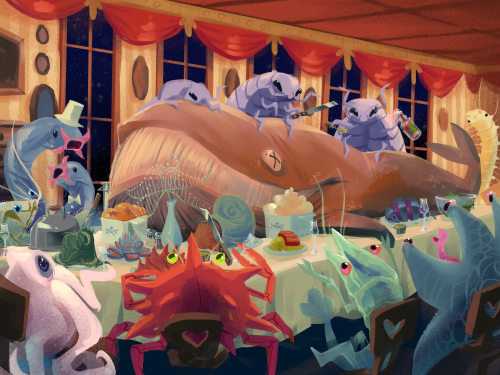

Merry Whalesfallsgiving!
More Posts from Enbylvania65000 and Others

Map of New Zealand in Mario-ish style.
by TheGeographyPin
I'm puzzled as to some of my recent followers. Why am I, a queer secular Israeli, getting followed by an anti-Israel account and by a socially conservative Christian nationalist? Are these hate follows?
a lot of you hate historians and archaeologists, and i think that’s a problem
look, i fully recognize that there are reasons to be skeptical of history and archaeology. i am very on board with criticizing academia as an oppressive institution, and the way that researchers take their bigotry and bias with them to their work. i also recognize that academia does a pretty bad job of communicating what it does to the public, and that’s a part of why people’s hostility to it is able to flourish.
but i am disturbed by the pervasive narrative in online leftist spaces that people who research the human past are ignorant and bigoted, and i think we need to do more to combat that narrative.
historians being homophobic has become a whole meme, and it feels like people are just using historians as a homophobia scapegoat, when in reality the humanities are overwhelmingly left-leaning. people also keep blaming historians for erasing the homoeroticism of fictional literary characters, which is just… not what historians do. homophobic biases and erasures in the interpretation of history over the past few hundred years are a very real thing that’s important to learn about, but scholars have radically shifted away from that approach in recent generations, and these memes are not helping people outside the field to understand history and reception. instead, a lot of people are coming away with the impression that…

(source… really? nobody?)
this thread gets bonus points for the comments claiming that modern historians argue about whether achilles was a top or a bottom using homophobic stereotypes, which i can only guess is a misunderstanding of the erastes/eromenos model (a relationship schema in classical greece; i think people have debated whether achilles and patroclus represent an early version of it). also a commenter claims that the movie troy invented the idea of achilles and patroclus being cousins when no, they were also cousins in lots of ancient sources.
there’s this post about roman dodecahedra (link includes explanation of why the original post is misleading).
there’s this thread about how some thin gold spirals from ancient denmark look exactly like materials used in gold embroidery to this day but archaeologists are stupid and don’t know that because they dont talk to embroiderers enough. in fact, the article says they were most likely used for decorating clothing, whether as a fringe, braided into hair, or embroidered. so the archaeologists in the article basically agree with the post, theyre just less certain about it, because an artifact looking similar to a modern device doesn’t necessarily mean they have identical uses.
this thread has a lot of people interpreting academic nuance as erasure. the museum label literally says that this kind of statue typically depicts a married couple, giving you the factual evidence so you can interpret it. it would be false to say “these two women are married” because there was no gay marriage in ancient egypt. (interpreting nuance as erasure or ignorance is a running theme here, and it points to a disconnect, a public ignorance of how history is studied, that we can very much remedy)
lots of other conspiracy theory-ish stuff about ancient egypt is common in social justice communities, which egyptologists on this site have done a good job of debunking
oh, and this kind of thing has been going around. the problem with it is that there are loads of marginalized academics who research things related to their own lives, and lived experience and rigorous research are different forms of expertise that are both valuable.
so why does this matter?
none of these are isolated incidents. for everything i’ve linked here, there are examples i havent linked. anti-intellectualism, especially against the humanities, is rampant lately across the political spectrum, and it’s very dangerous. it’s not the same as wanting to see and understand evidence for yourself, it’s not the same as criticizing institutions of academic research. it’s the assumption that scholars are out to get you and the perception that there is no knowledge to be gained from thorough study. that mindset is closely connected to the denial of (political, scientific, and yes historical) facts that we’ve been seeing all around us in recent years.
on a personal note, so many marginalized scholars are trying to survive the dumpster fire of academia because we care that much about making sure the stories that are too often unheard don’t get left out of history… and when that’s the entire focus of my life right now, it’s disheartening to see how many of my political allies are just going to assume the worst about the entire field

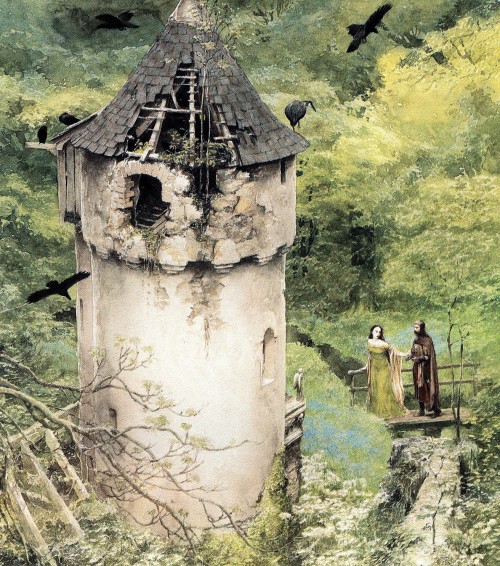
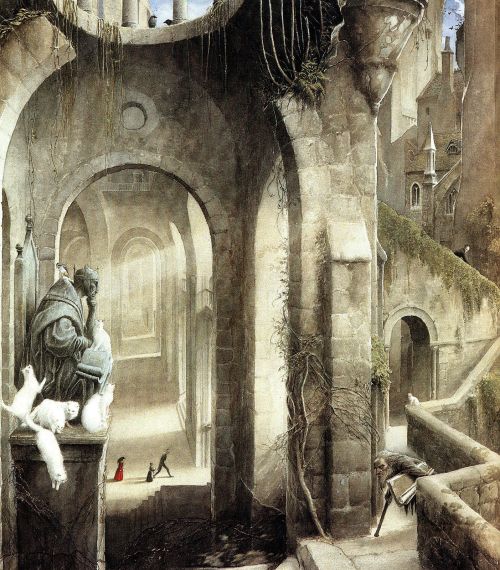


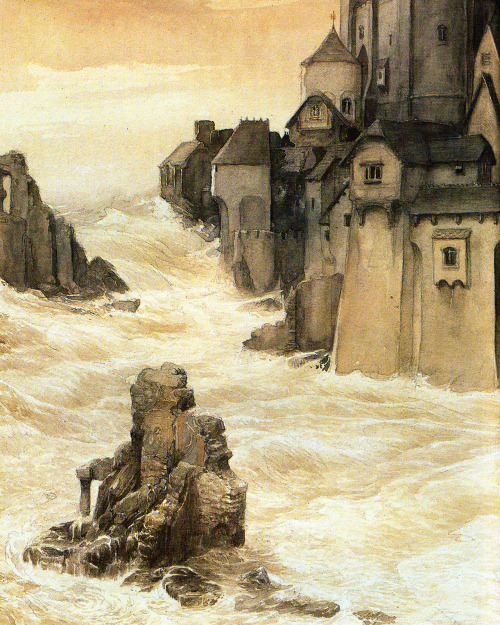
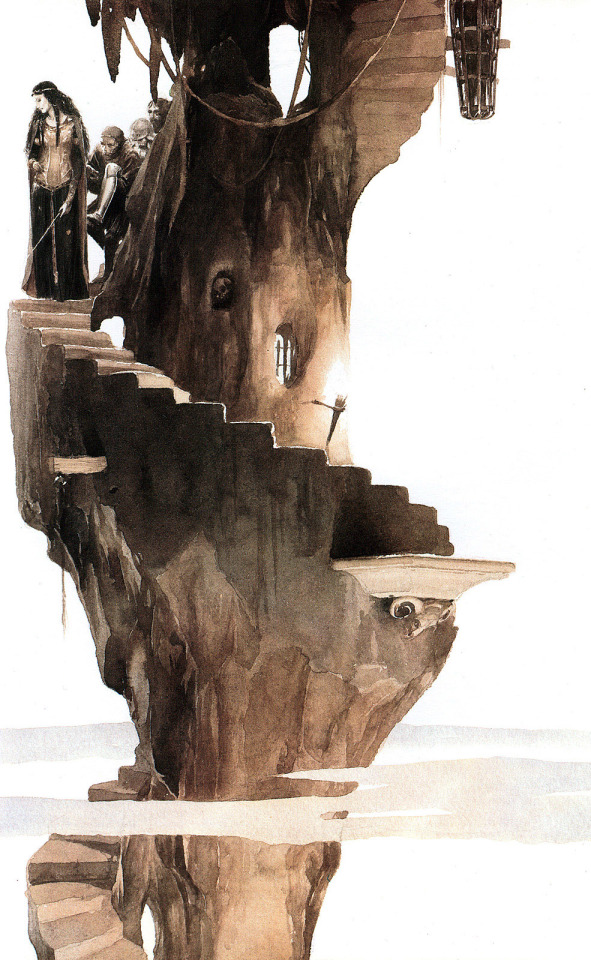
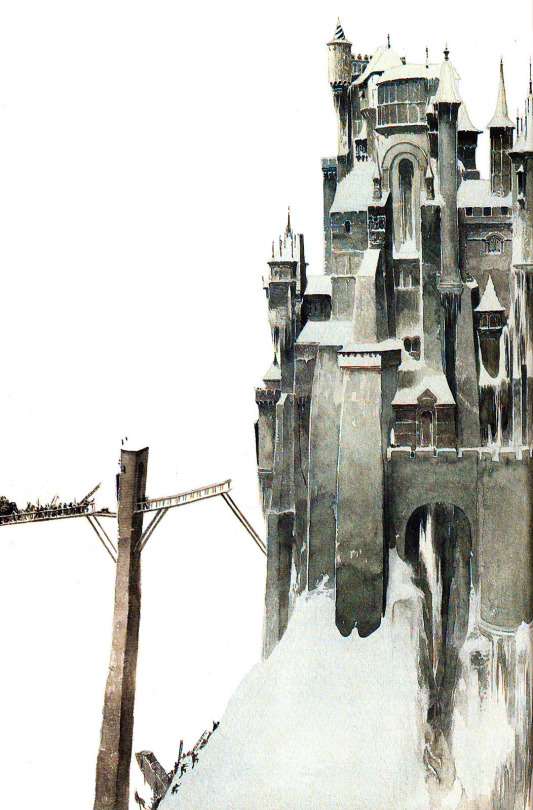
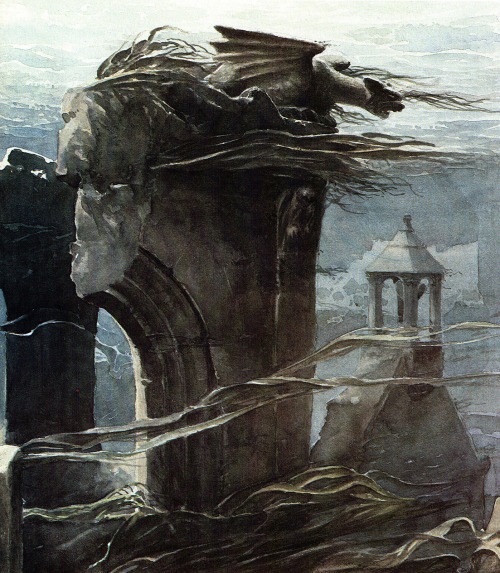
Castles - art by Alan Lee (1984)



The reduction gears and steam turbines under construction at the General Electric Plant, circa March 1942.

There are four sets of double reduction cross-compound geared turbines, with each turbine set driving a single shaft. “They offered almost 10-1 reduction to allow the turbines to run at much higher and more efficient rpm. These are some of the most critical components of the powerplant and one of the things which allowed long ranges in US battleships.“



Due to the date and the fact USS Iowa (BB-61) and USS Missouri (BB-63) were the only Iowa Class Battleships to receive General Electric gears and turbines, these are most likely for USS Missouri.


A man is shown deburring the edges of teeth with a file.
Note that they are double helix which eliminates axial thrust while providing the quieter running and increased strength of helically cut gears.
Photographed by Dmitri Kessel of LIFE Magazine. Identify by Peter Deforest.
LIFE Magazine Archive: 121941, 121944, 121942, 121943, 121940, 121945, 121946, 121949

All art is derivative. Yes, there should be protections of the rights of artists that their work can't be used in databases of AI art without consent. And yes AI does not consciously create art. In that sense, it is a tool for creating art. I don't see why these things make AI art inherently wrong or anyone using them wrong. By the way, I have only ever shared AI art with a small number of friends and only from programs I trust to be using public domain datasets You shouldn't paint everyone using AI for art with the same brush.
AI Art and Why It Can Go Die In A Fire
Why am I opposed to Stable Diffusion and AI Art in its current incarnation:
Some people seem to believe AI can “learn” art. Like it learns the concepts of perspective, value, anatomy, colour etc. through images and then recreates art based on this knowledge.
This is a misconception.
An AI doesn’t “know” things. It has no concept for artistic fundamentals. It just learns associations based on the data it’s given in a way that’s completely , vastly different to the way a human brain does. An AI can only recreate based on known image data. Those recreations can be blended in a very complex way, but they will ALWAYS be derived directly from image data it’s trained on.
A human can take a paint-bucket, and throw it at a canvas, and then mush paint around with their fingers. An AI can’t do that; it can only blend image data that best fits “canvas with messy splashed paint”. It will pull from all the image data it’s categorized with “canvas”, “splash”, “paint”, etc. and then blend them by placing datapoints next to other datapoints that it has “learned” will most suitably go next to each other.
Human learning creates complex conceptual structures. Our concept of an “apple” may contain many elements such as the colour red, how heavy it is, its overall form, how you hold it, and what it tastes like. An AI’s concept of an “apple” is whatever images it associates with the word “apple” based on text cues in its training.
When you tell it to paint “a hand holding an apple”, it will recreate and blend many images of hands with many images of apples in a way that best fit each other depending on weights defined by the data its analyzed.
Any presumption that AI can “learn” art theory and then make art through its knowledge of this is incorrect, and would require a level of general AI intelligence we are nowhere near capable of building yet, and we won’t with our current models because they are not creating actual epistemology, merely datapoint-based imitation without actual integration or understanding.
But the bottom line? All AI art is derivative and, unless it was trained exclusively on works in the public domain, there is definitely a case to argue that the companies creating these algorithms are violating the copyright of the artists whose works they are using without there first being a contract, agreement, or royalties (which is the thing these companies are trying to weasel out of by creating these AIs in the first place.) There is a reason why Clip Studio Paint, the latest of money-chasers jumping aboard the Stable Diffusion pony, issued out a warning that states, verbatim, “we cannot guarantee that images generated by the current model will not infringe on the rights of others.“
They know. They just don’t care- and everyone who ‘creates’ AI art is a willing participant in the infringing of copyright of millions of artists who never gave consent to have their works used in this fashion.
A Laboratory for Star Formation

Location: In the Carina spiral arm of our Milky Way Galaxy
Distance from Earth: About 20,000 light-years
Object type: Nebula and open star cluster
Discovered by: Sir John Herschel in 1834
Imaged here by the Hubble Space Telescope, NGC 3603 is a collection of thousands of large, hot stars, including some of the most massive stars known to us. Scientists categorize it as an “open cluster” because of its spread-out shape and low density of stars. Surrounding the bright star cluster are plumes of interstellar gas and dust, which comprise the nebula part of this cosmic object. New stars are formed from the gaseous material within these clouds! NGC 3603 holds stars at a variety of life stages, making it a laboratory for scientists to study star evolution and formation. Astronomers estimate that star formation in and around the cluster has been occurring for 10 to 20 million years.
Read more information about NGC 3603 here.
Right now, the Hubble Space Telescope is delving into its #StarrySights campaign! Find more star cluster content and breathtaking new images by following along on Hubble’s Twitter, Facebook, and Instagram.
Make sure to follow us on Tumblr for your regular dose of space!
The perfect storm of intelligence and agility
-
 dont-fuckle-with-the-shuckle reblogged this · 4 months ago
dont-fuckle-with-the-shuckle reblogged this · 4 months ago -
 narnianvalkyrieofberk reblogged this · 4 months ago
narnianvalkyrieofberk reblogged this · 4 months ago -
 queenofthebuckets reblogged this · 4 months ago
queenofthebuckets reblogged this · 4 months ago -
 queenofthebuckets liked this · 4 months ago
queenofthebuckets liked this · 4 months ago -
 cthulhu-lulu reblogged this · 4 months ago
cthulhu-lulu reblogged this · 4 months ago -
 axiang369 liked this · 9 months ago
axiang369 liked this · 9 months ago -
 feralfennecfox reblogged this · 10 months ago
feralfennecfox reblogged this · 10 months ago -
 scottbaiowulf reblogged this · 1 year ago
scottbaiowulf reblogged this · 1 year ago -
 that-consulting-hunter liked this · 1 year ago
that-consulting-hunter liked this · 1 year ago -
 dimity-lawn liked this · 1 year ago
dimity-lawn liked this · 1 year ago -
 ejbcya reblogged this · 1 year ago
ejbcya reblogged this · 1 year ago -
 aurorauroboros reblogged this · 1 year ago
aurorauroboros reblogged this · 1 year ago -
 conifae liked this · 1 year ago
conifae liked this · 1 year ago -
 scherzersbaldspot reblogged this · 2 years ago
scherzersbaldspot reblogged this · 2 years ago -
 bone-marrow-drinker liked this · 2 years ago
bone-marrow-drinker liked this · 2 years ago -
 vivalapluto999 reblogged this · 2 years ago
vivalapluto999 reblogged this · 2 years ago -
 tranziskool liked this · 2 years ago
tranziskool liked this · 2 years ago -
 microecobus liked this · 2 years ago
microecobus liked this · 2 years ago -
 mosswoodgrove reblogged this · 2 years ago
mosswoodgrove reblogged this · 2 years ago -
 chthonicmoth liked this · 2 years ago
chthonicmoth liked this · 2 years ago -
 muppetface-model reblogged this · 2 years ago
muppetface-model reblogged this · 2 years ago -
 tossittothevoid reblogged this · 2 years ago
tossittothevoid reblogged this · 2 years ago -
 esotericaries liked this · 2 years ago
esotericaries liked this · 2 years ago -
 rodentfaerie liked this · 2 years ago
rodentfaerie liked this · 2 years ago -
 invisableanimator liked this · 2 years ago
invisableanimator liked this · 2 years ago -
 secondscorn reblogged this · 2 years ago
secondscorn reblogged this · 2 years ago -
 scolopendragonfish reblogged this · 2 years ago
scolopendragonfish reblogged this · 2 years ago -
 mellowmelancholia reblogged this · 2 years ago
mellowmelancholia reblogged this · 2 years ago -
 distortedmoths liked this · 2 years ago
distortedmoths liked this · 2 years ago -
 mr-mango-tango liked this · 2 years ago
mr-mango-tango liked this · 2 years ago -
 desiccanttxt liked this · 2 years ago
desiccanttxt liked this · 2 years ago -
 catscatscatscatscatscatserybody liked this · 2 years ago
catscatscatscatscatscatserybody liked this · 2 years ago -
 jinklejimmy liked this · 2 years ago
jinklejimmy liked this · 2 years ago -
 rotcarnival liked this · 2 years ago
rotcarnival liked this · 2 years ago -
 rose-dewdrop liked this · 2 years ago
rose-dewdrop liked this · 2 years ago -
 psulphuratus liked this · 2 years ago
psulphuratus liked this · 2 years ago -
 wizardslime reblogged this · 2 years ago
wizardslime reblogged this · 2 years ago -
 graveyard-lagomorph liked this · 2 years ago
graveyard-lagomorph liked this · 2 years ago -
 tinyballerinadancer1 liked this · 2 years ago
tinyballerinadancer1 liked this · 2 years ago -
 n4m3n0tf0und liked this · 2 years ago
n4m3n0tf0und liked this · 2 years ago -
 delusive-sunny-days liked this · 2 years ago
delusive-sunny-days liked this · 2 years ago -
 dreamingmaple liked this · 2 years ago
dreamingmaple liked this · 2 years ago -
 howdyboyhowdy reblogged this · 2 years ago
howdyboyhowdy reblogged this · 2 years ago -
 howdyboyhowdy liked this · 2 years ago
howdyboyhowdy liked this · 2 years ago -
 seekerofweird liked this · 2 years ago
seekerofweird liked this · 2 years ago -
 eldritch-whispers liked this · 2 years ago
eldritch-whispers liked this · 2 years ago -
 khanmothman reblogged this · 2 years ago
khanmothman reblogged this · 2 years ago


